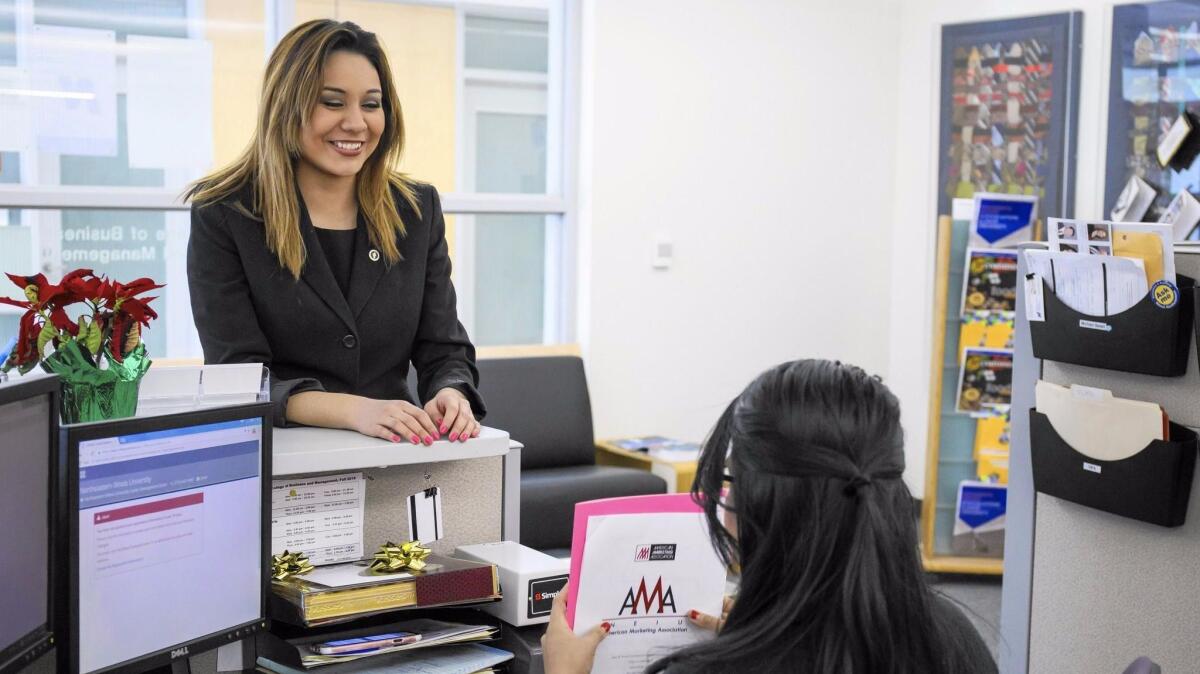Colleges must prepare students better for post-graduation jobs, Gallup report says

Alicia Mendoza was working two part-time jobs when she transferred into Northeastern Illinois University. Swamped with work, school and a daily commute, bolstering her resume with something extra was the last thing on her mind.
She thought getting good grades was enough to land her a job after graduation. Now she knows better.
“You can have a perfect 4.0 GPA, but that does not guarantee you a job,” said Mendoza, now a 24-year-old MBA student and graduate assistant in Northeastern’s College of Business and Management in Chicago.
Colleges and universities expend a lot of effort getting students in the doors, but there are worries that there isn’t enough focus on making sure the recruits land good jobs after graduation. More than half of college graduates say they visited their school’s career services office at least once, but only 16% said it was helpful, according to a recent report from Gallup and Purdue University.
The need for change in career services is evident, according to the report. Gallup found that barely 1 in 10 U.S. business leaders think a college education equips people with the right skills for their business.
Career services needs to be more than just an office students visit their senior year, said Brandon Busteed, executive director of education and workforce development at Gallup. It needs to reach students when they’re freshmen and incorporate mentors, internships and work experience.
Some colleges already have been making moves to do that. They are becoming mindful that not everyone comes from the same background, and not everyone is heading in the same direction.
The Career Development Center at Loyola University Chicago was reorganized about three years ago to expand and better prepare students for their careers.
It partners with Greek affairs, teaches classes and makes contact at freshman orientation. It maintains some of its traditional roles — advising students, tweaking resumes — but with a twist. Advising can be done over Skype, job leads are sent out via Twitter and tips on how to dress for an interview are posted on Pinterest.
“A lot of times students engaging with us don’t realize it’s us,” said the center’s director, Kathryn Jackson.
With the hiring landscape constantly shifting, many jobs that today’s students may eventually occupy haven’t been created yet. Rather than being trained for one type of job, students must learn how to develop certain skills — such as teamwork, problem-solving and leadership — and talk those up to potential employers, said Thy Nguyen, director of the career services office at the University of Illinois at Chicago.
“What matters to us is that they’re developing the core competencies which employers are telling us are important in the workplace,” he said.
Nguyen’s office ran a pilot program in which it trained on-campus supervisors to work with student employees on career planning, and helped faculty integrate those core skills into their lessons.
That “we’ll come to you” approach is especially important with first-generation and transfer students. Among graduates nationally, those two groups are less likely to say they visited career services as undergrads, according to the report.
“They’re literally trying to pay rent,” said Mendoza, herself a transfer student. “It’s tough.”
But those students will end up competing with traditional students, so they need to change their mind-sets, Mendoza said. The MBA student works in the dean’s office on the side, coordinating with the school to help students find jobs and internships.
At Chicago’s DePaul University, nearly 1 in 3 freshmen in 2016 were first-generation students, said Gillian Steele, assistant vice president of the school’s career center, and the school keeps that at front of mind.
It runs a program that gives a stipend to first-generation students working unpaid internships. “They’re working their way through college,” Steele said. “It [isn’t] easy for them to leave that job.”
The approach seems to be yielding results. In 2015, a higher percentage of first-generation students did an internship during undergraduate studies than those who weren’t first-generation students, Steele said.
DePaul requires all of its undergraduates to complete real-world experience, through an internship or research, for example. It runs a program that connects hundreds of alumni and other professionals with students. Gallup found that mentors can be a sort of lifeblood for students’ job searches.
Dontorrie Chatman can attest to that. He’s a senior at DePaul majoring in psychology with a minor in screenwriting. The 22-year-old planned to pursue a career in psychology, but a 20-page psychology paper his junior year made him realize it wasn’t the right path. Now his sights are set on screenwriting.
“I just applied for my first job at Netflix,” he said, sitting at his desk at DePaul’s Career Center, where he works part time helping other students. “[I’d be] mostly assisting an executive producer for original content.” He is waiting to hear back from Netflix about the status of his application.
Chatman’s parents did not go to college, and he knew no one in the screenwriting world when he decided to make the switch. But through the mentoring program, he connected with an alumnus who has done work at a couple of studios in New York, and was able to get some pointers.
“Everybody can help deliver the success of college grads,” Gallup’s Busteed said. “But I don’t think we’ve made it clear that everybody can have a productive role in that.”
ALSO
What it’s like wearing Snapchat Spectacles
What happens when a Hatchimal doesn’t hatch
What it means if Trump names China a currency manipulator
More to Read
Inside the business of entertainment
The Wide Shot brings you news, analysis and insights on everything from streaming wars to production — and what it all means for the future.
You may occasionally receive promotional content from the Los Angeles Times.










